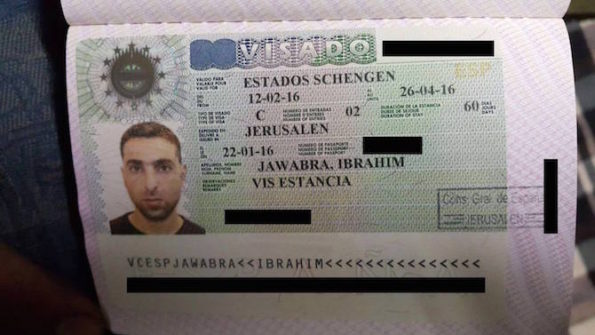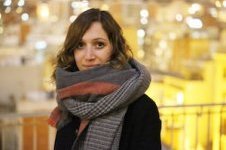Search
To search for an exact match, type the word or phrase you want in quotation marks.
A*DESK has been offering since 2002 contents about criticism and contemporary art. A*DESK has become consolidated thanks to all those who have believed in the project, all those who have followed us, debating, participating and collaborating. Many people have collaborated with A*DESK, and continue to do so. Their efforts, knowledge and belief in the project are what make it grow internationally. At A*DESK we have also generated work for over one hundred professionals in culture, from small collaborations with reviews and classes, to more prolonged and intense collaborations.
At A*DESK we believe in the need for free and universal access to culture and knowledge. We want to carry on being independent, remaining open to more ideas and opinions. If you believe in A*DESK, we need your backing to be able to continue. You can now participate in the project by supporting it. You can choose how much you want to contribute to the project.
You can decide how much you want to bring to the project.

From the moment in our language when we use personal pronouns, with which I can difference myself from you, from him, from them, the existence and necessity of the imagined limitations that condition the perceptions or narrations we make about the world become a fact the presence of which is hard to deny. Imaginary limits that don’t just serve for me, who I am, to remember I’m not you, nor them, and as such, the actions I carry out will be emitted from this being that I am. But moreover, the confines of the subject also delimit my frame of action, or to put it another way, the place where my liberties, responsibilities and duties end. However nice it would be, it’s impossible for me to conceive of a process of writing from you, not to mention writing from him. That you can’t be the one writing what I write, doesn’t mean to say that you can’t have conditioned what this text says. Be it because your authority defines the concrete number of words I must use, the subject, or the due date; or you taught me to write, recommended a book or talked to me about I don’t know what, or even because I don’t know you and speculate about what you would like to read. It depends on you being you.
I doubt that Ambrose Bierce, the American journalist who mysteriously disappeared in some undefined place between the United States and Mexico, was referring to this type of concrete limits when in The Devil ’s Dictionary (1911) he described a frontier as the imaginary line that in political geography is situated between two nations, to separate the imagined rights of one from the imagined rights of the others. But this definition can lead us to perceive personal pronouns as agents in the politics of the everyday micro-geographies through which all lives pass. If personal pronouns function as a frontier system, it is one tied to a superior authority: the one outlined by the limits of a language system in which these aporetic spaces defined by personal pronouns are written. To try to live an average life avoiding these limitations – for example, what separates me from you- would require a linguistic transformation of unimaginable magnitude. One as unimaginable, for the time being, as the idea of a world without frontiers. In any way, it is possible to test situations in which the other side of these limits become visible when language is situated in the terrain of poetry, and from there manage to represent the aporia with vertigo provoked by what we can’t understand.
Thinking of other practices, beyond the use of words and writing, on occasions poetic gestures are discussed. A dancer friend, Joana, explained to me that she began to take an interest in dance when one day she proposes to walk in a straight line, and 10 metres later comes across a tree or any other obstacle. But she persists in her desire to carry on in a straight line and has to improvise body movements that she hadn’t previously found herself doing. So much so she manages to overcome the obstacle as if it wasn’t there. This confrontation with a limitation triggers a series of new situations involving the absurd, which de-stabilizes the normative structures of the context where this all takes place. According to the French historian Pierre Vilar, it is from the frontier spaces, where the collision between body and tree happens, where one can observe the world and the political relations that take place. Relates that assume a determinate, visible form, often as a hindrance to the journey, a blocking of freedom. When all is said and done perhaps poetry occurs when a subject tries to overcome a limitation, a frontier, moving amidst an unknown terrain that of desire, such as the one described by Dante. Desire, which although initially made in a solid body, once expressed, becomes desire as a feeling, that which is desired because what one wants is the poetic potential contained by this sensation of desire. There comes a point that one talks and creates a desire that is not entirely real directed at a particular body, so much as towards an unknown idea. It is the action of desiring that becomes the subject of desire, not in its materiality so much as in its abstraction, for all that the sensation of desire provokes and generates.
The Palestinian artist, Ibrahim Jawabreh, also referred to a desire to overcome limits, specifically those of reaching the West, in the interview he granted Pilar Sampietro for the programme “Mediterráneo” on Radio 3. This artist finally reached Spain last 12 February, along with a 22 tonnes stone, the protagonist of the journey that gave rise to the project “The Artist and The Stone”, which Matteo Guidi and Giulianna Racco have been working on for months. Fragments and documentation from which, they have shown on various occasions. The beginnings of the project are situated in the aims of Guidi and Racco to trace the remains of the stones that formed an ancient aqueduct, located between what is currently a refugee camp and Palestine. What they came across was a wall and Jawabreh, a Palestinian artist born in the refugee camp of Al Arroub, situated in the West Bank, with a desire to travel to the West, who found himself in a bureaucratic void that prevented him leaving the country. So like my friend Joana (the dancer) who on colliding with a tree begins to make new movements that evidence the physical impossibilities imposed by the tree blocking her way, Guidi y Racco, on encountering a wall and meeting Jawabreh and his desire, put into action a series of gestures to overcome, somehow or other, not just the physical but also the political obstacles they encounter. They devise a new challenge, no less ambitious than the previous one, that of bringing Jawabreh and a 22 tonnes block of stone from Palestine to Barcelona.
Who would have said that the 22 tonnes stone would reach Barcelona before Jawabreh, even with the support of Guidi and Racco and that the difference wouldn’t be of seconds or minutes, but of weeks. The paradox is no greater than that supposed by the conflict described by the artist in the interview for Radio 3, when he explains that because of the political conflicts, the border controls and checkpoints in Palestine mean it can take two hours to traverse a trajectory that in other places would take less than ten minutes. Not just because you can’t go in a straight line so much as because you have to overcome a bureaucratic labyrinth, governed by the highly complex protocol that forms part of the frontier systems of this context. The case is weeks after the huge stone arrived, been exhibited in the Fundación Suñol and the Pla de Palau, and after months of the many types of legal procedures that Jawabrehas as much as Guidi and Racco became immersed in, the Palestinian artist managed to obtain the necessary visa to come to Barcelona to stay for two months. In this sense, it’s pertinent to remember the description the philosopher Fina Birulés made of the word liberty, when she described it as the capacity to appear where you are not expected. To be an organism capable of circulating, of transporting yourself from one point to the other heeding your own desires, without being blocked by any physical or political obstacles, is thus to be free. Without wanting to be a killjoy, even though it should be celebrated that the artist finally managed to reach Barcelona, it has to be said that Jawabreh was evidently expected where he arrived and he wasn’t alone during all the processes that he had to follow to achieve this. Unfortunately, making it to Barcelona doesn’t make him any freer, just as reaching Europe doesn’t make the Syrian refugees freer, no doubt because, like Jawabreh, they are also expected and the places where they will go and the time they will stay is decided for them. They are considered to “have escaped” when they try to move towards any place they have not been assigned. In short, beyond what is physically possible, and what isn’t, the gesture of authority marks the limits of what is possible in the collective imaginary encompassing the pronoun us and the pronoun them. After all this, perhaps, comes everything else.

Anna Dot was born on a Sunday in April. She is from Torelló and works between two worlds, worlds that she cannot perceive as being in any way separate: one of artistic production and one of reflection, writing about contexts of art.
"A desk is a dangerous place from which to watch the world" (John Le Carré)